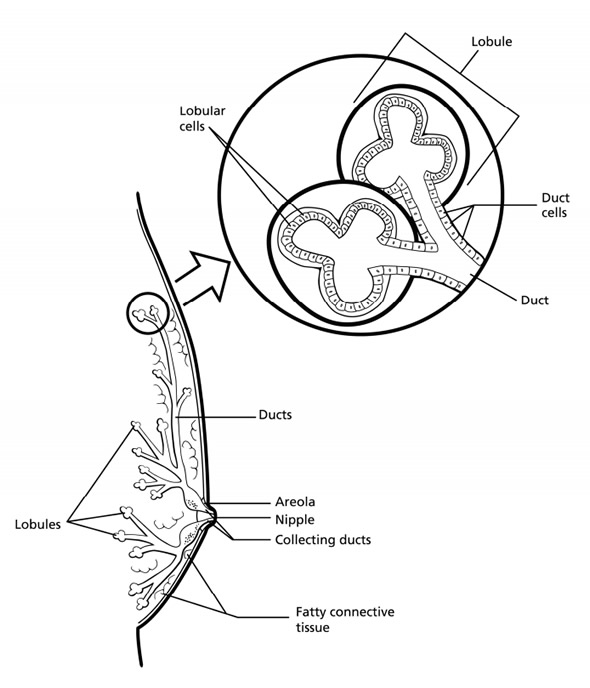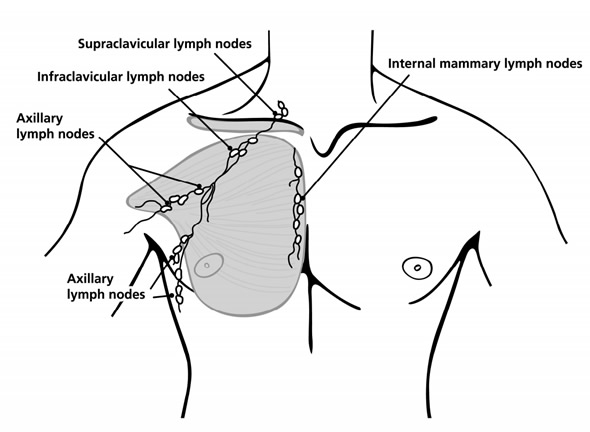Breast cancer is commonly believed to be a disease affecting women alone, but men can also get this cancer. In men however, the cancer is much rarer than in women with only one in every 100,000 men affected.
The normal male breast
The normal male or female breast has:
- lobules (milk-producing glands)
- ducts (tiny tubes that carry the milk from the lobules to the nipple)
- stroma (fatty tissue and connective tissue surrounding the ducts and lobules
- tiny blood vessels, and lymphatic vessels

Male breast structure

Lymphatic system of the male breast.
Until puberty, young boys and girls have a small amount of breast tissue consisting of a few ducts located under the nipple and areola (dark area around the nipple). At puberty, the female hormones in girls cause the breast ducts to grow, lobules to form at the ends of ducts, and the amount of stroma to increase.
In boys, male hormones made by the testicles keep breast tissue from growing as much as females. Men's breast tissue has ducts, but only a few if any lobules.
Causes of breast cancer
Certain risk factors predispose to developing male breast cancer. The most important of these is age as most cases develop after 70 years of age. Those who are alcoholic or obese are also at a greater risk. The risk is high among patients who have a family member (male or female) with breast cancer.
Also, men with a rare genetic condition called Klinefelter's syndrome are 20 to 50 times more likely to get breast cancer than normal men. Men with Klinefelter's syndrome have an extra, female, X chromosome, making them XXY, and often have slightly more breast tissue than normal.
The highest risk factors include radiation to the chest when young and exposure to hormonal therapy for other disease conditions. Men with high blood levels of female hormone estrogen are at risk of breast cancer.
How many people does male breast cancer affect?
In the UK around 300 new cases of breast cancer in men are diagnosed annually with majority patients over 60 to 70 years of age. In the United States 2,190 men are expected to be diagnosed, and 410 are expected to die from the disease in 2012.
Rates of breast cancer are slightly higher in Jewish men. This could due to genetic associations between breast cancer and some inherited genes.
Worldwide there are highest rates in Zambia. This could be due to common endemic liver infections there that lead to increased production of estrogen in men. Japan has a lower incidence of breast cancer for both men and women.
Symptoms of male breast cancer
The most common symptom of male breast cancer is development of a hard, painless lump over one of the breasts or clear or bloody discharge from one of the nipples. The shape of the affected breast and the nipple may differ from the other. If the cancer has spread to the lymph nodes in the respective armpit, the glands there may be swollen as well.
Male and female breast cancer comparison
Similarities and differences in male and female breast cancer:
- Most of the risk factors for breast cancer in men are also seen in women.
- The signs and symptoms of the disease are the same in both sexes and the responses to treatment are similar.
- Survival from breast cancer is similar in men and women
- The same types of tumors seen in women are also seen in men
- The average age of diagnosis however is five to ten years later for men than for women.
- The number of estrogen receptor containing breast tumors (estrogen receptor positive tumors) in men is higher than in women
Treatment of male breast cancer
Male breast cancer is treated primarily with surgery to remove a section of the breast. Thereafter chemotherapy and/or radiation therapy may be used to kill the residual cancer cells.
Chemotherapy and radiation therapy may be used alone if the cancer is advanced and spread to other organs as well. Hormonal therapy with tamoxifen that helps to block the effects of hormones on breast tissue that are known to stimulate the growth of cancerous cells may be used to prevent the cancer recurrence.
Outlook for male breast cancer
The outcome of therapy in male breast cancer is less favourable than for breast cancer in women. This is mainly because the cancer is often detected at a later stage and there is a lack of awareness of the condition.
However, those diagnosed at stage 1 have a 75-100% rate of survival 5 years after diagnosis, those diagnosed in stages 2 or 3 have a 50-80% rate of five year survival and those diagnosed in stage 4 or advanced stages have a 30-60% rate of five year survival.
Further Reading
Last Updated: Mar 13, 2023